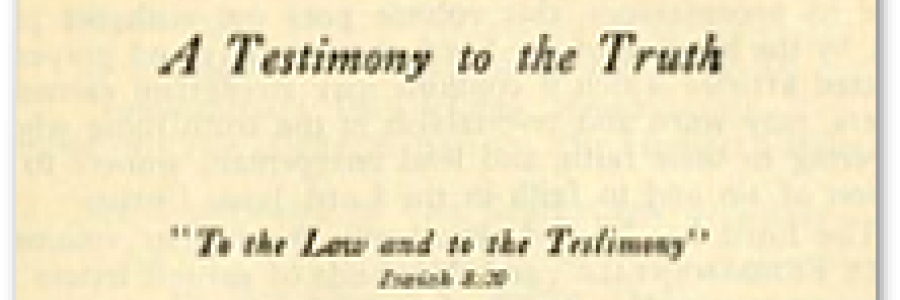Three Peculiarities of the Pentateuch Which Are Incompatible With the Graf-Wellhausen Theories of Its Composition
CHAPTER VII - THREE PECULIARITIES OF THE PENTATEUCH WHICH ARE INCOMPATIBLE WITH THE GRAF-WELLHAUSEN THEORIES OF ITS COMPOSITION
BY ANDREW CRAIG ROBINSON, M. A., BALLINEEN, COUNTY CORK, IRELAND, AUTHOR OF “WHAT ABOUT THE OLD TESTAMENT?”
There are—amongst others—three very remarkable peculiarities in the Pentateuch which seem to be incompatible with modern theories of its composition, and to call for some explanation from the critics.
Discussion
Trying to Get the Rapture Right, Part 4
(Read the series so far.)
So far I have tried to establish a base in biblical texts for my further inquiry into the rapture. Remember, I write as a non-too-dogmatic pre-tribber whose interest in these posts is to think through the various approaches.
Few Major Rapture Passages
All proponents of the rapture must acknowledge that there are very few direct references to the catching up of the saints. Without 1 Cor. 15 and Jn. 14, perhaps Matt. 24, but especially 1 Thess. 4, we would not be talking about it. Of these, only the 1 Thessalonians 4 passage can be deemed a direct statement about the “catching up” or “seizing out” of the saints in the end time. By a direct statement I mean a text which plainly and unequivocally puts across a doctrine. Examples of this in other areas include, Gen. 1:1 stating that God created all things, or Rom. 5:1 which says Christians are justified by faith. These are C1 statements in the Rules of Affinity. Well nigh all the major doctrines of Scripture can be ascertained and proposed via C1 passages.
What this means is that in addition to these texts, supporters of the viewpoints must marshal arguments from other statements of Scripture (hopefully direct statements) about related teachings. It is the proper inclusion and assimilation of these teachings which creates the differing schools of thought on our subject.
Discussion
Book Review - Invitation to the Life of Jacob
Dr. Donald Sunukjian has had more influence in the area of expository preaching on the current generation of pastors than anyone except Haddon Robinson. I remember one of my seminary professors having us watch a video of Dr. Sunukjian doing a first person narrative sermon on Esther. It was my first introduction to that type of handling of Old Testament narrative, and I was hooked.
Discussion
Rejecting Six Literal Days - What's the Real Motivation?
Body
“Are they really arguing from Scripture using a grammatical-historical interpretive method? Or are they actually influenced by ideas outside of Scripture concerning the supposed old age of the universe/earth and the nature of what is deemed to be ‘science’?”
Discussion
So Long New York: American Bible Society Heads to Philly
Body
“A year after putting its iconic building on the market, ABS exits the Big Apple after nearly two centuries.” CT
Discussion
The Bible on Clark Pinnock's Open Theism, Part 1
The problem of evil presents a challenge for philosophers and theologians who hold to the existence of God. Simply stated, the problem includes three conditional premises and a concluding question: If God is all powerful, all knowing, and all beneficent, then how can evil exist? In order to resolve the problem that the concluding question implies, one of the three premises has to be denied or altered.
While I would suggest that the problem can only be resolved by understanding and defining the beneficence of God through the lens of His holiness (as emphasized in Isaiah 6 and Revelation 4), the theology of divine openness, otherwise known as open theism, attempts to answer the question by denying the other two premises. Open theism is on the extreme end of the “free-will” spectrum as a philosophical attempt at resolving the problem.
Discussion
Book Review – A Passion for the Fatherless
While adoption has been going on for a long time it has enjoyed a recent spike in attention within Evangelical circles. The accompanying wave of recent books on adoption has been good for both to-be adoptive parents and families as well as the children whom they adopt. Parents can be better equipped and children can be better cared for with their varying needs.



Discussion